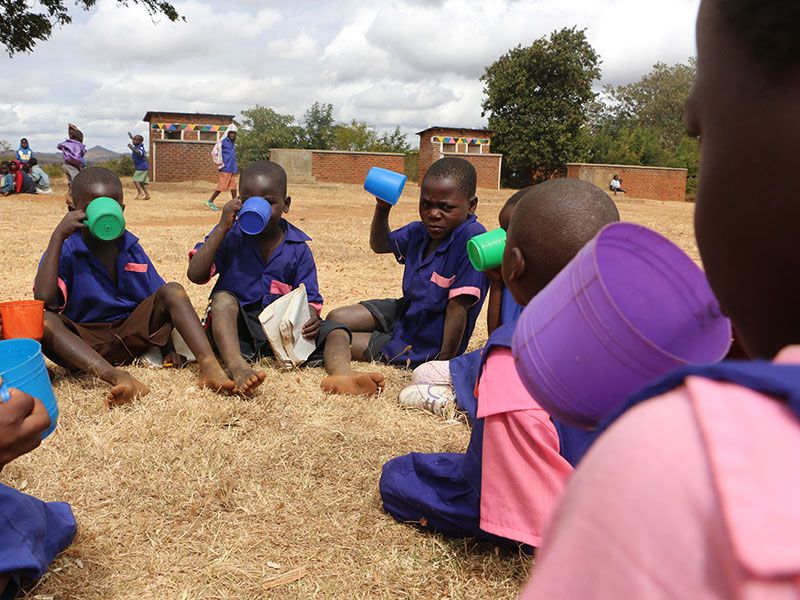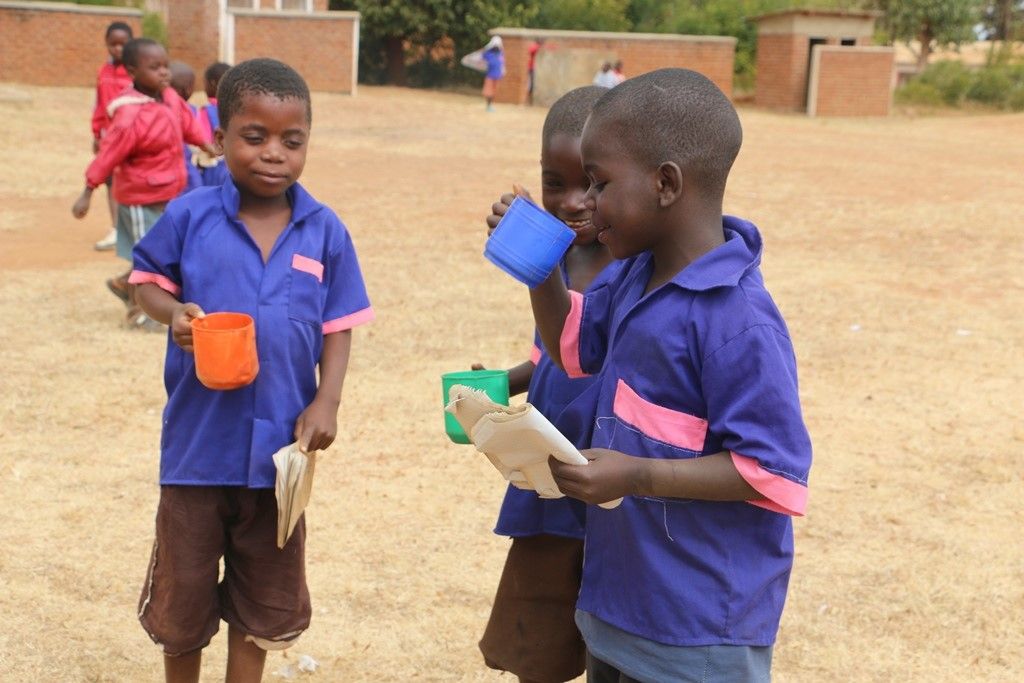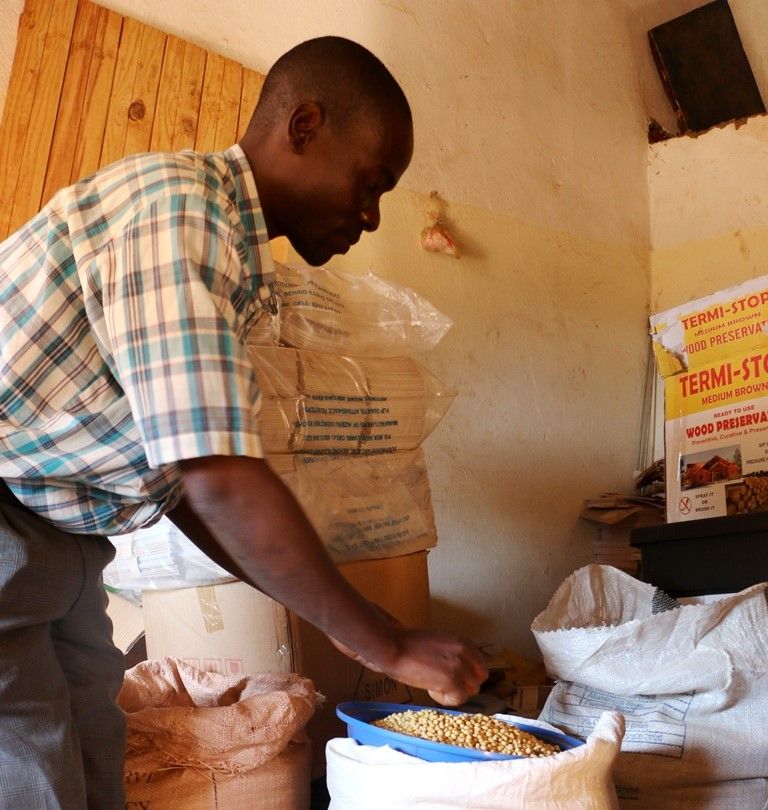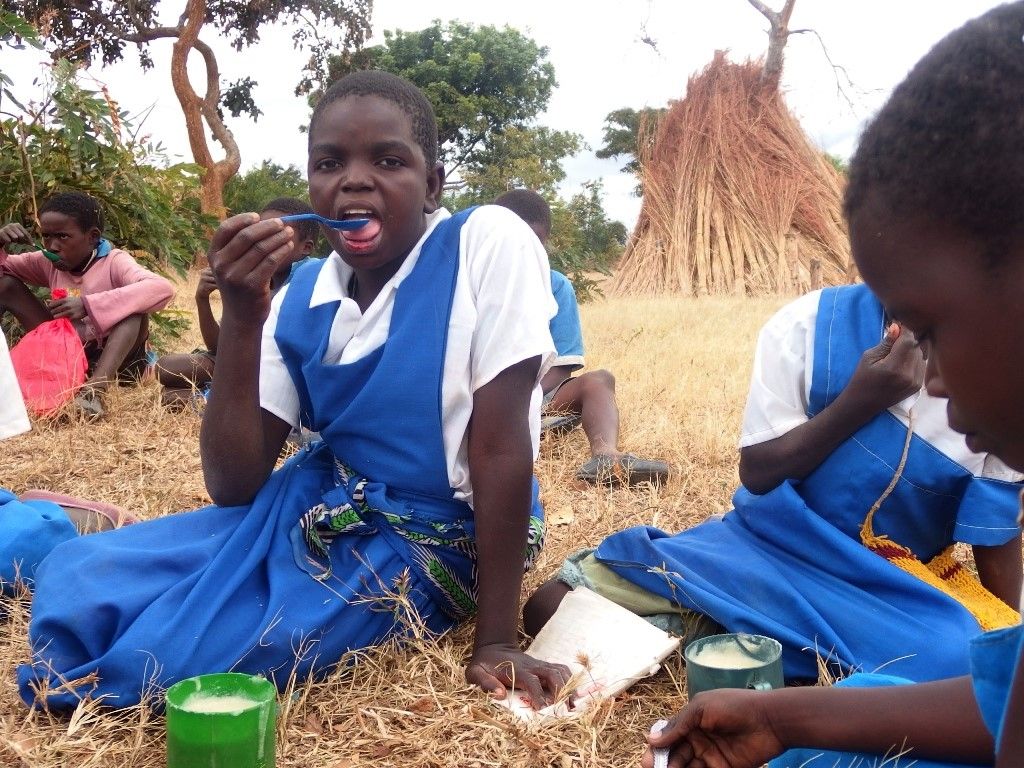Written by DAPP Malawi. Posted in Let children stay in school stories

Nutrition activities in schools of Malawi make a big difference both on reducing malnutrition, promoting children’s development and getting children to stay in school.
8 million Malawians are estimated to face hunger in 2016/2017 season. The food crisis has a direct effect to education of children and young girls from poor households.
According to UNICEF Malawi, there has unfortunately been no change in children's nutritional status since 1992 and malnutrition rates remain unacceptably high with about 46 percent of children under-five year olds stunted, 21 percent underweight, and four percent wasted. Micronutrient deficiencies are common. The unfortunate conditions have a strong effect on children’s participation in education and on how much they learn when they are in school.
It is apparent, therefore that the situation is likely going to increase school dropouts as children will focus on their stomach rather than studies and even the poor families will find little importance to send their children to school.
However, there is a ray of hope among teachers at Mzumazi Primary School in Lilongwe rural that the effects of hunger will be responded to by the DAPP Malawi project Let Children Stay in School supported by the Roger Federer Foundation. The project among other initiatives encouraged the school to cultivate soya for a school feeding programme, targeting pupils in junior classes.
“We were given 20 kgs of soya bean seeds and we have harvested 3 bags of soya beans each weighing 75 kgs.” said Felix Phiri, one of the teachers at Mzumazi Primary School.
“We are expecting that once learners start eating food here at school they will enjoy learning and at the same time this will assist us in reducing absenteeism of learners and they will have improved learning, because once one has taken food it is easy to learn.”
This daily meal provision at the school will provide a strong incentive to parents to send their children to school and keep them there and it will help pupils to focus on studies at the same time.
In this year of hunger, this school meal programme is going to give a regular and nutritious meal to children from Mzumazi School.
School based feeding activity form part of the many elements which “Let the Children Stay in School project” is contributing to improving the quality of teaching in the primary schools of Malawi. The establishment of school feeding for the children is also being carried out through mobilisation of the parents around the school to produce for the sustainability of the daily meals.
The project is building capacity of 600 primary school teachers in a total 114 primary schools and reaches approximately 50,000 children attending standards 1 to 2 of their primary school education over a period of 3 years. Most importantly, the project is expected to reduce dropout rate for children attending primary school in the designated districts.
September 2016
Written by DAPP Malawi. Posted in Let children stay in school stories
 Soya Milk Improving Leaner’s Turnout At Masangano Junior Primary School
Soya Milk Improving Leaner’s Turnout At Masangano Junior Primary School
Masangano Junior Primary School in Malumo village, T/A Malumo in Ntchisi district had been experiencing number of school dropouts and this worried the head teacher for the school Mr. Andrew Kalikuni.
According to Mr. Kalikuni, at the beginning of 2015-2016 academic calendar, the school registered 106 pupils for class of Standard 1, but on average he said only 50 to 60 students were coming to school and attending classes.
“Now the classes are full, student’s likes to be in class” says Mr. Kalikuni
One of the reasons that has improved the turnout of learners at the school particularly in standard 1 and 2 is the provision of milk to learners every morning.
The milk provision began in 2016 after mother group members at Masangano school were trained by DAPP on how to make milk out of soya beans. They were also trained on making jam, juice and Mbaula.
Now mother group members are providing milk to pupils in junior class everyday during break time. This milk is not only helping the learners to take away hunger but also it is so nutritious, best for health of these learners.
“We take the milk to school for pupils to drink so that they stop complaining of being hungry while learning” says a chairperson for Masangano mother group, Agnes Kaliati
Kaliati says mothers have seen a change since milk became part of break time drink for the pupils at the school. She said their children have stopped running away from class and go home early to fetch food.
“They love to go to school because they know that they will miss milk if they dare to stay home.” Adds Kaliati
Masangano junior primary school has a total 316 pupils and the school head teacher boasts that with the leaner friendly environment at the school like playground and milk, there is possibility that his school will continue to register a lot of new students.
 Masangano primary school in Ntchisi was established in 1992. Since then, the school has been a junior primary school with only 2 classroom blocks to accommodate standard 1 and 2 learners.
Masangano primary school in Ntchisi was established in 1992. Since then, the school has been a junior primary school with only 2 classroom blocks to accommodate standard 1 and 2 learners.

 Soya Milk Improving Leaner’s Turnout At Masangano Junior Primary School
Soya Milk Improving Leaner’s Turnout At Masangano Junior Primary School DAPP Malawi School Feeding Programme To Reduce Dropouts At Mzumazi Primary School
DAPP Malawi School Feeding Programme To Reduce Dropouts At Mzumazi Primary School Mothers From Chikusa Primary School Understand Value Of School Feeding Programme
Mothers From Chikusa Primary School Understand Value Of School Feeding Programme “Our children were running away from class before class time is over, rushing home to get food. But since the start of this porridge pupils have stopped that practice and some who dropped out of school are back and we hope more pupils will be coming to attend classes because they will be eating food here.”
“Our children were running away from class before class time is over, rushing home to get food. But since the start of this porridge pupils have stopped that practice and some who dropped out of school are back and we hope more pupils will be coming to attend classes because they will be eating food here.”